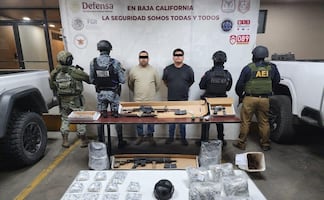Juan Carlos Baker
, Foreign Trade Deputy Secretary of the Ministry of Economy , said that while expectations have been raised about the renegotiation scenario of the North American Free Trade Agreement (NAFTA), Mexico is not yet out of danger on the terms of the amendments to the trade agreement.
"I do not want you all to go away with the idea that we are either out of danger or that we are already well or that we are now magically going to sit down and somehow we will have agreements in a few minutes. It will be a long renegotiation” said the official.
Participating in the forum "What is at stake for Mexico in the renegotiation of NAFTA?", Organized by the Mexican Council of Foreign Trade (COMCE), the official stressed that the renegotiation will be an intense process where they have already are foreseeing journeys from 6 to 7 days a week in meetings over 12 hours long.
"I am convinced that we will succeed in the negotiation if we are convinced of what we can and can not do," he said.
The deputy secretary made clear that Mexico will not accept a negotiation that seeks to establish tariffs or affects the chains of value that exist between both countries.
"A negotiation in that sense is unacceptable," he said.
Baker said it is possible to conclude the renegotiation before the 2018 presidential elections in Mexico, although both the United States and Canada will need to be in the same direction to conclude the agreement.
The official pointed out that there will be no "copy-paste" of the Trans-Pacific Partnership (TPP) to improve the NAFTA and that Mexico will continue with the parallel negotiations to improve other trade agreements, mainly with Europe.
On the subject, IQOM Commercial Intelligence Director Sergio Gómez Lora said that the renegotiation of the NAFTA has ended its first stage where the legal framework for the debate was discussed and now enters a stage of technical discussions.
The businessman stressed that the Mexican private sector worked very well with its US counterpart and that US businessmen stopped President Donald Trump when he wanted to leave the NAFTA before completing 100 days of government.
Miguel Jáuregui, president of the Mexican Foreign Trade Congress (COMCE) for North America, said that the uncertainty regarding the terms of the NAFTA's renegotiation has ended and now the renegotiation should be sought to include issues of dispute resolution improvement, electronic commerce and intellectual property.
al
Noticias según tus intereses
[Publicidad]
[Publicidad]














